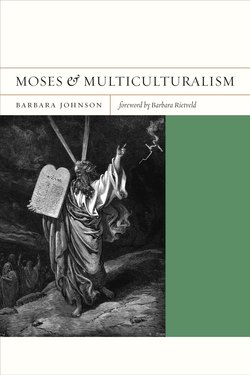Читать книгу Moses and Multiculturalism - Barbara Johnson - Страница 7
На сайте Литреса книга снята с продажи.
ОглавлениеFOREWORD
If the story of Moses didn’t exist, Barbara Johnson might have invented it to illustrate concepts she began writing about in 1980. “The problem of difference,” she wrote in the Opening Remarks to her first book, The Critical Difference, “can be seen both as an uncertainty over separability and as a drifting apart within identity.” The focus in this new volume functions as a prism through which she looks at the “separability” of the cultures that have contributed to the formation of the Moses figure through stories told by different peoples and how the “drifting apart within identity” played out in each culture that claimed him as its own.
The point of departure in Moses and Multiculturalism is the mixed identity that Moses carried within him: he was born a Hebrew, raised as an Egyptian, and married as a Midianite, then returned to Egypt to liberate the slaves from whom he had been estranged. Johnson explores those dimensions through her analyses of the biblical Moses, the Egyptian Moses, the Frances E. W. Harper Moses, Freud’s Moses, and others.
“What literature often seems to tell us,” Johnson has observed, “is the consequences of the way in which what is not known is not seen as unknown. It is not, in the final analysis, what you don’t know that can or cannot hurt you. It is what you don’t know you don’t know that spins out and entangles ‘that perpetual error we call life’ ” (p. xii). In each version of the Moses story, it is the parts of the story that were unknown or unrecognized that give away each “difference.” Flavius Josephus doesn’t depict the idolatry in the Golden Calf episode, Zora Neale Hurston seems to have no inkling that Moses might not be Christian, Thomas Mann makes Moses’ mother an Egyptian princess, and so on. Who is the real Moses, and what do these different identities signify?
Multiculturalism may be one of these things we don’t know that we don’t know; this at least is one of the most fertile and disturbing suggestions of Johnson’s most recent study of the idea of difference, identity, and the unknown as it manifests itself in the multicultural icon of Moses. What do we think we know? We know, for example, that the term multicultural emerged in the 1960s in Anglophone countries in relation to the cultural needs of non-european migrants. Since that time, it has become such an integral part of our discourse that it has almost lost its meaning. If you Google multiculturalism, there are 3,750,000 entries—books, courses, articles, panels, diversity training videos, the Ayn Rand Center for Individual Rights—the list is endless.
Multiculturalism, which has been taken to mean a smorgasbord of cultural identities, is here confronted not only with the difference between identities but also with the difference within identities. Using multiculturalism to explain and explore difference refers to an objective Johnson set forth in A World of Difference (1987): “to transfer the analysis of difference out of the realm of linguistic universality or deconstructive allegory and into contexts in which difference is very much at issue in the ‘real world’ ” (p. 2).
In the “real world,” this is a good time to look back at a biblical figure who has been analyzed by theologians, historians, biblical scholars, psychoanalysts, and literary critics but rarely as “someone who functions well in a world to which he, unbeknownst to the casual observer, does not belong.” This description applies to the millions of immigrants and displaced people who currently find themselves in foreign environments, to people alienated in their own country or their own skin, and to everyone who doesn’t “fit.”
The idea of functioning well or otherwise in a place to which one—one person, one word, or one concept—does not belong has been a part of my conversations with Barbara Johnson for the past forty years. This study is one more piece in her work that sheds new light, one more story that we have read so often and thought we knew.
Barbara Rietveld
